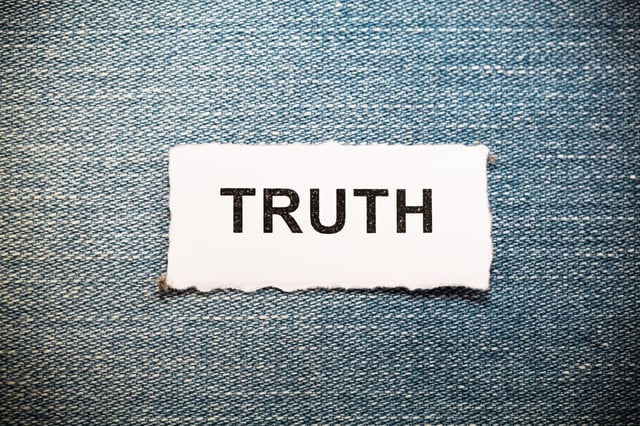There’s been a lot of truth-speaking filling the social discourse lately...and a lot of not-truth speaking. With the proliferation of sexual assault discussions as well as the more recent Black Lives Matter discourses arising nationwide, the idea of “speaking your truth” is front and center.
Have you ever wondered why you don't give voice to your truth? Before we discuss how to find your voice, let’s figure out where the phrase came from in the first place. If we’re honest, it’s been a buzzword for a while. This is not a straightforward walk down memory lane to one definitive point where people suddenly started saying “speak your truth.” In fact, in all my research through blogs, the National Archives, Oprah speeches and self help books, I wasn’t able to find a decisive origin, even though it's a part of emotional intelligence.

The phrase predates its modern sibling “stay woke,” which Erykah Badu helped popularize in 2008’s New Amerykah album and the Black Lives Matter Movement revived around 2013. Speaking your truth was around before Elizabeth Gilbert framed her bestseller Eat, Pray, Love around the idea. It came before Snoop Dogg coined his version—”speak on it”—and before Oprah preached it from her first talk show and famously said, “I wanted to be a broadcast journalist because I believed in the truth." Perhaps it started when the phrase “speak truth to power” was published in a 1955 Quaker manifesto and became a rallying call against violence. Perhaps it goes back to Mark Twain a century earlier: “Truth is stranger than fiction, but it is because Fiction is obliged to stick to possibilities; Truth isn't.”
Speaking your truth might be trending, but it is far from a passing trend.
Finding your voice should not be a lifestyle trend either—it is a constant practice. As writer Stephenie Zamora pointed out, speaking your truth is not always enough; “Honoring your truth is usually the really hard part.” This is a lifelong, mindfulness practice.
Can you remember a time when you wanted to speak up in order to have your needs met or your voice heard...and you didn’t? It could’ve been as a child with your caregiver, early in a fledgling relationship, with a stranger that made you uncomfortable or any countless number of other scenarios. Speaking up is not confined to one stage of life or one demographic.
Its Origins May Be Unclear, But Speaking Your Truth Is Vital
Possibly the only universal factor when it comes to making your voice heard is that it is challenging. Kings, slaves, movie stars and small children have all struggled with being heard.
 While no cure-all advice exists, it does help to break up the mission into its separate parts: Speak. Your. Truth. Each word is vital. First, the subject “your” means you have to identify who you are and what you believe. This takes introspection and a topic we come back to again and again: Emotional Intelligence. Next, what you’re addressing is Truth. Implicit in the word is both a sense of validity and timeliness. This is not your opinion, feelings, or thoughts—it goes down to your heart and soul.
While no cure-all advice exists, it does help to break up the mission into its separate parts: Speak. Your. Truth. Each word is vital. First, the subject “your” means you have to identify who you are and what you believe. This takes introspection and a topic we come back to again and again: Emotional Intelligence. Next, what you’re addressing is Truth. Implicit in the word is both a sense of validity and timeliness. This is not your opinion, feelings, or thoughts—it goes down to your heart and soul.
Once you’ve delved deep into who you really are and discovered what truth is imperative to you, the place where many people get stuck is in expressing it. Once you speak, you put yourself and your truth out there. This can be metaphorically speaking, too—anything from the silent sit-ins of the Civil Rights movement to Prada’s militant 2018 spring collection. The point is, others can see it, hear it, and—this is the toughest—respond (or react) to it.
Allowing your truth to be heard is arguably the hardest part.
On a road trip recently, my fiancé and I were discussing the most recent sexual harassment allegations in the news and I was struggling with a newspaper article I was writing about the topic in my own local community. It made me genuinely sad that neither of us could ever truly know what the other one experienced, and I was even more disheartened by the fact that I do not have a clear solution to this issue that is rocking not just the global news but my own neighborhood.
Then we stopped so I could run into a gas station for the restroom and my fiancé stayed in the car.
Because I felt I should buy something, I grabbed a pack of gum and a drink and went to the register to check out and ask for the bathroom key. As I swiped my credit card the two young men behind the register chuckled to each other and one said, “you married?” My response: “I’m going to be. Why?”
“Oh, it’s just...you’re pretty.”
I had just been talking with my fiancé about times like these that come out of the blue and make me uncomfortable, and trying to get him to understand that—my truth—was incredibly difficult. This young man probably would not have asked my fiancé, a 6-foot-plus pilot, if he was married. Let alone commented on his attractiveness.
I left without even asking about the restroom.
But before I went, I did speak up: “I don’t think that’s an appropriate comment to make to a customer.”
“I thought girls liked that kind of thing.”
I walked out flustered, embarrassed for some reason even though I believed what I did was right and it was important to say something. Even in this tiny incident with a person I do not know and will probably never see again—speaking my truth was uncomfortable.
Speaking your truth is not just for women who get hit on in gas stations. It’s not just for the Black Lives Matter movement, motivational speakers, political dissenters or Erykah Badu. Its origin is murky because it belongs to everyone. Claiming your right to a voice and struggling with the existential question of “what is your truth?” is universal. How many other things do Elizabeth Gilbert, Snoop Dogg, Oprah, Mark Twain, and Quakers have in common?
When it’s uncomfortable, go one word at a time: Speak. Your. Truth. One word, one instance, one day at a time.
As Seth Godin says about stepping out of your comfort zone:
“Change your mindset. When you do something outside your comfort zone, what’s the worse that can happen? The answer is usually nothing.”
Related reading: "9 Easy Ways You Can Speak Your Truth Today"
If you're asking how do you find your voice or if you're feeling anxious about speaking up in your life and would like some support, contact us at Heartmanity.








